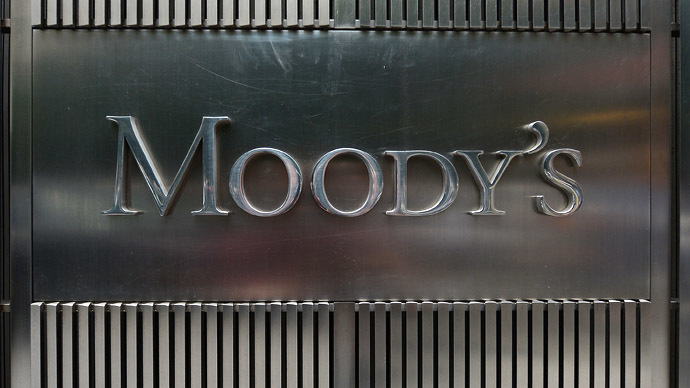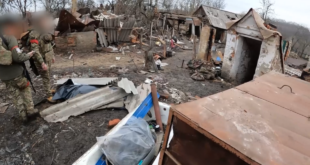RT
April 6, 2014

Moody’s Investors Service has downgraded Ukraine’s government bond rating one notch from Caa2 to Caa3, citing the current political crisis and deepening economic instability as reasons for its negative outlook.
The Caa rating is a credit risk grading pertaining to investments that are both very poor quality and entail a high credit risk. The current downgrade drops Ukraine from Moody’s “extremely speculative” rating to “default imminent with little prospect for recovery.”
Moody’s said the downgrade was driven by three factors, which “exacerbate Ukraine’s more longstanding economic and fiscal fragility.”
The first factor is Ukraine’s political crisis, citing the recent regime change in Kiev and subsequent events in Crimea. The agency went on to cite Ukraine’s stressed external liquidity position, which faces continued decline in foreign currency reserves, the withdrawal of Russian financial support and a spike in gas import prices. Moody’s further noted that this assessment accounts for the near-term liquidity relief recently hammered out with the IMF. Finally, due to a “sizable fiscal deficit,” the agency expects a significant contraction of GDP and a sharp currency depreciation as the debt to GDP (Gross Domestic Product) ratio hits between 55-60 percent by year’s end.
On Thursday, Gazprom CEO Aleksey Miller announced Ukraine would begin paying $485 per thousand cubic meters of natural gas starting from April. The price rise followed a cancelation of the Black Sea hosting deal. On Wednesday President Vladimir Putin signed a federal law ending Russia’s commitment to the Kharkov Agreement, as the Black Sea port of Sevastopol is now under jurisdiction of the Russian Federation. This follows another steep hike on April 1, when the price Ukraine paid for gas went up 44 percent to $385, after Kiev failed to meet its debt repayments.
Last December, Russia offered Ukraine’s Yanukovich-led government a $15 billion loan and a 33 percent discount on natural gas: a lifeline to help its faltering economy. Moscow went through with the purchase of a $3 billion Eurobond from Kiev, though Russia later froze both the gas deal and the credit- line, due to events on the ground.
On Friday, Ukraine said it had started emergency talks with European Union neighbors on the possibility of importing natural gas from the West.
Based on these factors, Moody’s said the country was unlikely to see Ukraine’s sovereign debt rating improve in the near future, stating its outlook for the country was negative. Any improvement would only come if long-term political and economic improvements were forthcoming. In January, Ukraine also saw its sovereign rating fall by one notch.
After Ukraine reached a preliminary deal with international lenders to unlock $27 billion in assistance late last month, the International Monetary Fund (IMF) announced last week a $14-18 billion standby credit for the country.
However, in order to secure the IMF credit, the country of 46 million was forced to cancel fuel subsidies to private citizens and businesses, sparking a 50 percent hike in oil and natural gas bills.
Ukraine has also promised the IMF it will cut its budget deficit to 2.5 percent of GDP by 2016.
“The country is on the edge of economic and financial bankruptcy,” Prime Minister Arseniy Yatsenyuk said in Kiev last week. “This package of laws is very unpopular, very difficult, very tough. Reforms that should have been done in the past 20 years.”
Yatsenyuk warned GDP could shrink by 3 percent in 2014, while inflation could hit up to 14 percent.
 Daily Stormer The Most Censored Publication in History
Daily Stormer The Most Censored Publication in History


